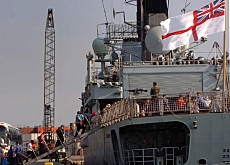
Large contingent of Swiss leaves Lebanon

The Swiss foreign ministry has announced that 250 nationals were evacuated from Lebanon on Wednesday as fighting continued in the region for the eighth day.
Foreign Minister Micheline Calmy-Rey said she hoped that any remaining Swiss wishing to leave would be able to do so in the coming days, and called for the creation of a humanitarian corridor.
The ministry said that Swiss citizens had managed to leave Lebanon either by road or by sea. Thirteen Swiss joined an Austrian convoy that left Beirut for the Syrian capital Damascus.
The other Swiss were put on board foreign warships and a ferry. Around 170 nationals found place on the Greek landing ship Ikaria, while 41 others were transported away from Beirut on the French frigate Jean de Vienne.
Thirty Swiss also joined other groups of foreigners on the Greek ferry Iera Petra, chartered by the French. These vessels, which left during the afternoon or early evening, were all headed to Larnaca in Cyprus.
The larger number of Swiss able to leave Lebanon is likely to ease the pressure on the Swiss authorities. After 130 nationals got out over the weekend, just 15 had managed to leave Beirut since the beginning of the week.
Plans to evacuate 40 Swiss on the Iera Petra on Monday had fallen foul of security concerns, with the ferry forced to leave the Lebanese capital before embarking all its passengers.
With the latest departures, around 400 Swiss have left Lebanon, but Calmy-Rey said efforts would continue to ensure all nationals – perhaps more than 100 – are evacuated.
The Swiss are particularly concerned about the welfare of around 50 Swiss in southern Lebanon, the area that Israeli forces have bombed the most as they attempt to root out the Islamic Hezbollah based there.
However, the foreign ministry has refused to give any details about its efforts to evacuate those nationals for security reasons.
Dramatic situation
Calmy-Rey added that the situation was extremely difficult to deal with, especially given the destruction of much of Lebanon’s important infrastructure. Beirut airport has been shut down, roads have been destroyed and the port only functions intermittently.
She said that diplomatic efforts would have to concentrate on the creation of a maritime humanitarian corridor, as demanded by the Lebanese authorities.
Speaking on Swiss television, Calmy-Rey described the current humanitarian situation in Lebanon as “dramatic” and the political one as “difficult.” She added that she had promised the Lebanese prime minister on Tuesday Switzerland would provide all the humanitarian aid it could.
Switzerland has officially condemned Hezbollah’s military actions against Israel and Israeli attacks against civilian targets in Lebanon. The foreign minister said that Israeli actions were disproportionate and contravened humanitarian law.
The Geneva-based International Committee of the Red Cross (ICRC) has said that it is seriously concerned about civilian casualties and new health risks as violence continues to escalate in Lebanon.
The ICRC said on Wednesday that it was “extremely concerned about the grave consequences that military action is still having on the civilian population.”
The organisation reminded both parties to the conflict of their obligation to distinguish between civilians and military personnel and targets.
“The high number of civilian casualties and the extent of damage to essential public infrastructure raise serious questions,” said Pierre Kraehenbuehl, director of operations for the ICRC.
Obligations
The ICRC claims that under international law, the current Israeli air and sea blockade of Lebanon must not prevent foodstuffs and other essential supplies from reaching the civilian population.
The humanitarian agency is asking for an initial SFr10 million ($8 million) to help displaced and vulnerable people, as well as supporting medical services of the Lebanese Red Cross.
“We have reminded the Israeli authorities of their obligation under international humanitarian law to respect and protect medical personnel and their means of transport,” said Kraehenbuehl.
He added that so far the ICRC had been unable to visit the two soldiers whose capture by Hezbollah sparked the Israeli assault.
“To date there has not been a positive response from Hezbollah to that request,” Kraehenbuehl admitted.
The ICRC, which contacted Hezbollah after the capture, urged the group to treat the two captives humanely “and to respect their lives and dignity”, the director of ICRC operations said. “We insisted that the two soldiers must be allowed to contact their families.”
swissinfo with agencies
The fighting – the worst since Israel invaded southern Lebanon in 1982 – was triggered after Hezbollah seized two Israeli soldiers in a cross-border raid last week.
The Islamic militant movement is part of the Lebanese government and is backed by Syria and Iran.
Eight days of Israeli bombings have caused the deaths of over 300 Lebanese, according to the ICRC.
A total of 29 people had been reported killed by Hezbollah attacks on the Israeli side of the border, including 14 soldiers and 15 civilians.
The Swiss foreign ministry says there are 838 Swiss nationals registered as resident in Lebanon, of which 713 hold dual nationality.
400 Swiss have managed to leave Lebanon since evacuations began.
Family members can contact the foreign ministry hotline for further information on +41 31 325 33 33 from 8am to 9pm.
Swiss charities have freed up funds worth SFr450,000 for actions in Lebanon and the Gaza Strip, where Israeli forces are also conducting operations.

In compliance with the JTI standards
More: SWI swissinfo.ch certified by the Journalism Trust Initiative

























You can find an overview of ongoing debates with our journalists here . Please join us!
If you want to start a conversation about a topic raised in this article or want to report factual errors, email us at english@swissinfo.ch.